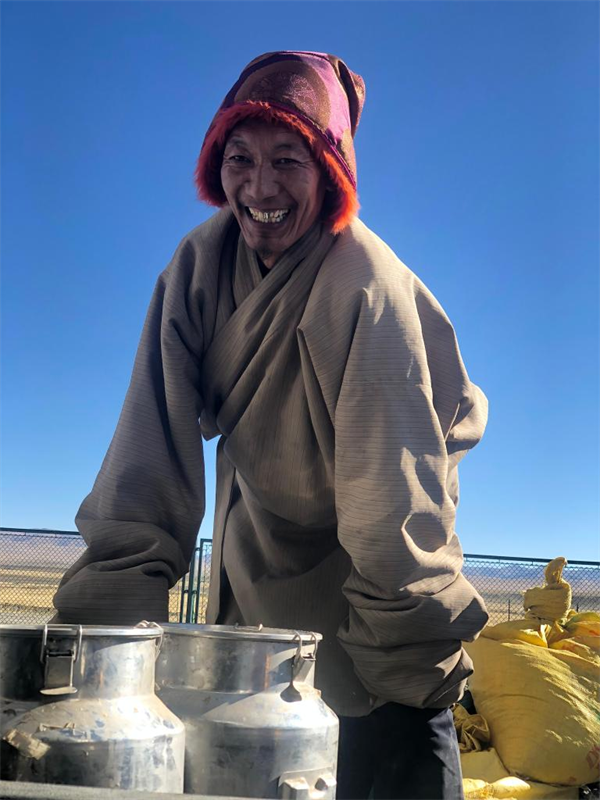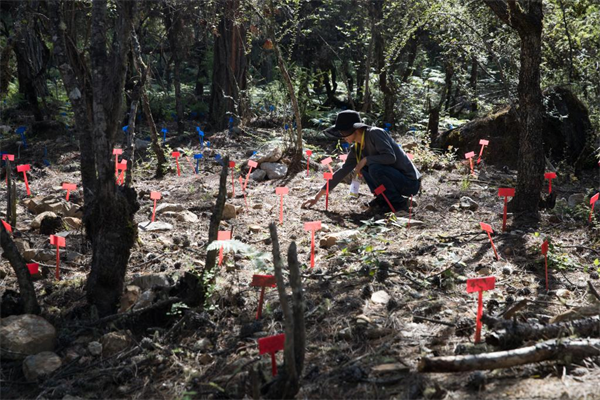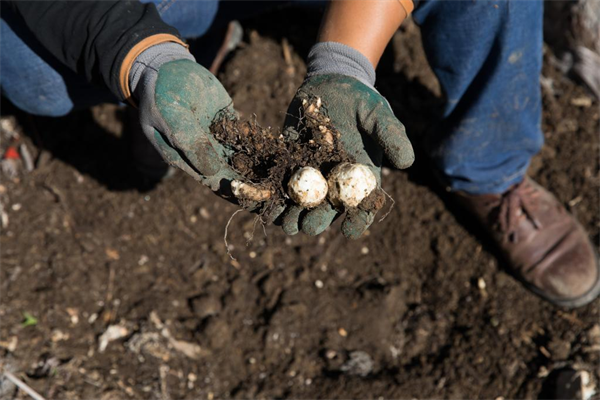Booming specialty industries bring more income to people in Tibet
Updated: 2023-01-11 (chinadaily.com.cn)  Print
Print 


"I'd like one pack of yogurt and two bottles of fresh milk," 30-year-old Qiongdag said to a shop owner in downtown Lhasa, capital city of the Tibet autonomous region, "the quality of yogurt and fresh milk at this shop is good, as good as that from a farm." The shop is just one of the chain stores of the Gaerd Eco-Animal Husbandry Industry Development Co., Ltd. of Nagchu city.
With an average altitude of over 4,500 meters, Nagchu has the largest pasturing area in the Tibet autonomous region. Serni district of Nagchu city started to develop the Gaerd ecological animal husbandry industry demonstration base in 2017 by making use of local resources to promote the development of animal husbandry. The demonstration base purchases fresh dri milk from farmers and herdsmen, and uses traditional techniques to process the milk into diary products, such as yogurt and ghee, which are sold to consumers in Nagchu, Lhasa and other areas.

A herdsman sells fresh dri milk to Gaerd Eco-Animal Husbandry Industry Development Co., Ltd. [Jin Yiqing/Xinhua]
Mingjiata, leading executive of the company, said that after several years of development, the base has successfully established an operation model for yak breeding, namely "company + milk supply base + village cooperatives + farmer households". At present, the demonstration base is operating smoothly and generates more than 20 million yuan in sales annually.
Tsering Phuntsok, head of the collective cooperative at Daga village in Seni district, said that the cooperative collects milk from herdsmen, sells the milk to the demonstration base and pays herdsmen on the same day. Tsering Phuntsok has more than 140 yaks producing more than 35 kilograms of milk a day, which brings in income of over 800 yuan for him.
Mingjiata said that the herdsmen can also increase their income by taking short-term or long-term jobs and transferring pasture use rights. According to the company, it has benefited 5,614 local households since its establishment.
Bomi county in Nyingchi city has a long history of gastrodia elata planting. But for a long period of time, gastrodia elata planting brought little income to the local people due to scattered planting mode and low output.
In 2020, Bomi county brought in a R&D team and established Tibet Bomi Plateau Tibetan Gastrodia Elata Industry Development Co., Ltd., which cultivated gastrodia elata in wild conditions of forests and has created a new development opportunity for gastrodia elata planting.

A worker inspects growth of Tibetan gastrodia elata in the woodland of Dongruo village, Jammu town, Bomi county. [Jin Liwang/Xinhua]
"Our top task in Bomi was to find wild gastrodia elata and armillaria mellea to breed Tibetan gastrodia elata seeds," said Qiu Quanlei, general manager of Tibet Bomi Plateau Tibetan Gastrodia Elata Industry Development Co., Ltd. After arduous work and numerous tests, the company finally made it.
Today, the company plants nearly 1,700 mu (more than 133 hectares) of Tibetan gastrodia elata and allocates 20 mu (1.33 hectares) of land for fine seed breeding. Planting Tibetan gastrodia elata in woodlands does no harm to the forests. Once the planting technique is promoted to more households, local residents can plant Tibetan gastrodia elata around their houses to develop a courtyard economy.
Up to date, the company has provided free training on the techniques of planting Tibetan gastrodia elata for 14 administrative villages in Bomi county, and more than 1,000 local people are benefiting from the program. Locals can also increase income through the transfer of woodland use rights, the leasing of woodland and part-time jobs. In 2022, the company made nearly 20 million yuan in revenue and paid locals more than 3 million yuan for their work and the leasing of woodland.

A worker inspects growth of Tibetan gastrodia elata in the woodland of Dongruo village, Jammu town, Bomi county. [Jin Liwang/Xinhua]
Songji Drolma, who is 25 years old, lives in Daxing village, Jammu town, Bomi county, and her husband Zhang Jinlei, who works at the logistics department of the company, earns more than 8,000 yuan per month. She said that under the guidance of the technicians of the company, Zhang has mastered the techniques of planting gastrodia elata and she believes that their life will get better in the future.








